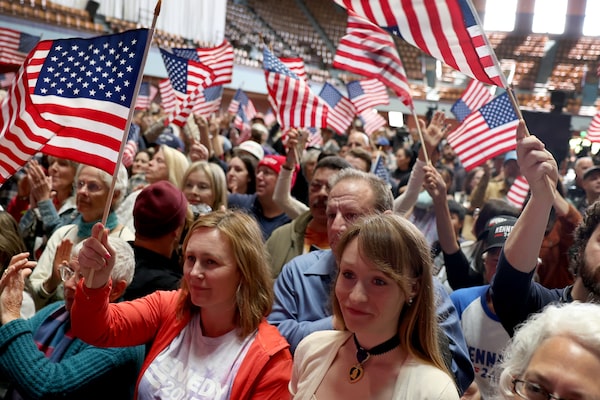
People wait for the arrival of Independent presidential candidate Robert F. Kennedy Jr. as he prepares to announce his pick for running mate at the Henry J. Kaiser Event Center on March 26, in Oakland, Calif.Justin Sullivan/Getty Images
A controversial figure running a controversial third-party presidential campaign has chosen a controversial running mate with a controversial profile.
Then again, Robert F. Kennedy Jr., the son of the slain 1968 presidential candidate, doesn’t do anything by the book, doesn’t hold conventional views and doesn’t proceed in politics in the customary way.
So maybe the choice of Nicole Shanahan – who created a foundation to spur innovation in areas ranging from climate change to criminal justice reform, helped bankroll Mr. Kennedy’s US$7-million Super Bowl ad and was at the centre of a lurid Silicon Valley divorce – isn’t out of character for a candidacy that has the capacity to throw the 2024 U.S. presidential election into turmoil.
Ms. Shanahan, 38, is the most unlikely vice-presidential candidate in modern American history. Earlier alternative-party candidates have chosen for their running mates military figures such as Air Force General Curtis LeMay (George Wallace’s selection in 1968) and Navy Vice Admiral James Stockdale (Ross Perot’s in 1992) or senators such as Burton Wheeler of Montana (Robert La Follette’s in 1924) and Glen Taylor of Idaho (Henry Wallace’s in 1948).
Though Ms. Shanahan, the daughter of a Chinese immigrant, has considerable academic involvement, particularly at Stanford, and has cultivated a reputation for seeking fresh solutions to difficult social, cultural and scientific challenges, she has no political experience and has collected a series of detractors in the California tech community, much the way her patron, Mr. Kennedy, has collected detractors in the Washington political community.
“She’s not well known in the tech sector as an entrepreneur in Silicon Valley, nor is the company she founded,” said Kara Swisher, the prominent tech commentator and author of Burn Book, a tech-world memoir currently ranking sixth on the New York Times bestseller list, in an interview.
As much as Ms. Shanahan – who divorced Google co-founder Sergey Brin amid published reports, swiftly denied, of a relationship with SpaceX founder and former Tesla chairman Elon Musk – will be examined for her suitability for being a fatal heart attack away from the Oval Office, it is Mr. Kennedy, and the possibility that his candidacy could complicate the fall election, who is the principal concern of conventional politicians and strategists for both President Joe Biden and former president Donald Trump.
Though poll results suggest Mr. Kennedy’s campaign is slightly more dangerous for Mr. Biden than for Mr. Trump, in truth both major-party candidates fear the disruption the Kennedy campaign could wreak. The latest Harris poll, conducted for the Harvard Center for American Political Studies, shows Mr. Kennedy with 15 per cent to 17 per cent of the vote in a three-way race.
No reputable pollster, commentator, political strategist or political scientist believes Mr. Kennedy can win the White House, largely because of the barriers third-party candidates face in the American political system. Though Theodore Roosevelt came in second as the “Bull Moose Party” candidate in 1912, he was a former president (1901-1909) who drained enormous support from Republican President William Howard Taft, his hand-picked successor who later ran afoul of the progressive Roosevelt wing of the GOP.
“These parties can push for change, but they’re unlikely to win,” said Bernard Tamas, a Valdosta State University political scientist and author of the 2018 book The Demise and Rebirth of American Third Parties. “One of the differences between the American and Canadian systems is that American elections are far more expensive and smaller parties simply cannot get their messages out. The Democrats and Republicans have a huge resource advantage in money and infrastructure. The American major parties simply overwhelm alternative parties.”
Moreover, Mr. Kennedy lacks the sweeping theme projected by Mr. Perot (budget deficit), George Wallace (states’ rights), Henry Wallace (national health insurance) and Mr. Roosevelt (“dissolve the unholy alliance between corrupt business and corrupt politics”). Instead, the Kennedy campaign is a melange of nostalgia (multiple references to the glory days of John and Robert Kennedy), conspiracy theories (on COVID-19, vaccines and gun violence) and progressive impulses (principally on the environment.)
Mr. Kennedy’s campaign has been derided by four of his siblings, who last October released a statement saying they “denounce his candidacy and believe it to be perilous for our country.” The introduction of Ms. Shanahan, who donated to the Pete Buttigieg and Biden campaigns four years ago and is expected to help Mr. Kennedy raise money, drew similar derision.
“She has absolutely no qualifications whatsoever for the vice-presidency or presidency other than being over age 35 and having been born in the United States,” said Matt Bennett, a co-founder of Third Way, a Democratic-oriented group opposing non-traditional candidacies. “This campaign gives a platform to his ideas, which are not only crazy but extraordinarily dangerous. And while there’s 0.0 per cent chance of RFK Jr. winning the election, third-party candidates can affect the outcome and maybe help Trump win.”
Indeed, the presence of consumer advocate Ralph Nader on the Green Party ballot line in the overtime election of 2000 very likely tipped the vote away from vice-president Al Gore to Governor George W. Bush of Texas.
“This is the great worry,” said former House Democratic leader Richard Gephardt of Missouri, a Democratic presidential candidate in 1988 and 2004 and now a prominent figure in Citizens to Save Our Republic, a group asking alternative candidates not to seek ballot lines in the six battleground states of the 2024 election. “This is going to be a razor-thin election, so any percentage of votes taken away from Biden will help elect Trump. It’s that simple.”